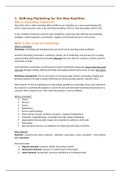1. Defining Marketing for the New Realities
Why is marketing important?
Many firms have a chief marketing officer (CMO) to put marketing on a more equal footing with
other C-level executives such as the chief financial officer (CFO) or chief information officer (CIO).
To do: carefully monitoring custumers and competitors, improving value offerings and marketing
strategies, satisfy employees, stockholders, suppliers and channel partners in the process.
What is the scope of marketing?
What is marketing?
Marketing= identifying and meeting human and social needs (meeting needs profitably)
American Marketing Association: marketing= activity, set of institutions and processes for creating,
communicating, delivering and exchanging offerings that have value for customers, clients, partners
and society at large.
Social definition: marketing= societal process by which individuals and groups obtain what they need
and want through creating, offering and freely exchanging products and services of value with others
Marketing management= the art and science of choosing target markets and getting, keeping and
growing customers through creating, delivering and communicating superior customer value
Peter Drucker Aim of marketing is to make selling superfluous (overbodig). Know and understand
the customer so well that the product or service fits him and sells itself (marketing should result in a
customer who is ready to buy). Then make the product or service available.
What is marketed?
Goods
Services
Events
Experiences
Persons (self-branding)
Places (attract tourists, residents, factories, company headquarters)
Properties (=eigendommen, are bought and sold, require marketing)
Organizations (boost public images and compete for audiences and funds)
Information
Ideas (products/services are platforms for delivering some idea or benefit)
Who markets?
Marketer= someone who seek a response – attention, a purchase, a vote, a donation – from another
party (prospect)
8 demand states
1. Negative demand: consumer dislikes the product (avoid)
2. Nonexistent demand: unaware or uninterested in the product
3. Latent demand: strong need, cannot be satisfied by an existing product
, 4. Declining demand: buy the product less frequently or not at all
5. Irregular demand: purchases vary (seasonal, monthly, weekly, daily, hourly)
6. Full demand: buying all products
7. Overfull demand: more demand than can be satisfied
8. Unwholesome demand: attracted to products that have undesirable social consequences
Markets
Market: describe customer groups
Need markets, product markets, demographic markets, geographic markets, voter markets, labor
markets, donor markets.
Consumer markets consumer goods and services
Business markets business goods and services
Global markets cultural, language, legal, political differences (entering, adapting products and
services, set prices, communicate)
iprofit and Governmental markets limited purchasing power. Price carefully.
What are some core marketing concepts?
Needs, wants and demands
Needs= basic human requirements
Wants= directed to specific objects that might satisfy the need
Demands= wants for specific products backed by an ability to pay
5 types of needs:
1. Stated needs (inexpensive car)
2. Real needs (car whose operating cost, not initial price, is low)
, 3. Unstated needs (expects good service from the dealer)
4. Delight needs (would like the dealer to include an anboard GPS system)
5. Secret needs (wants freinds to see him as a savvy consumer)
Target markets, positioning and segmentation
Segements of buyers (demographic, psychographic, behavioral differences)
Target markets market offering that positions in target buyers
Offerings and brands
Value proposition= set of benefits that satisfy customer needs
Made physical by an offering (products, services, information, experiences)
Brand= offering from a known source (associations)
Marketing channels
Communication channels= deliver and receive messages from target buyers (newspapers, magazines,
radio, television, mail etc.)
Distribution channels= help display, sell or deliver physical product or service to the buyer or user
(direct via internet, mail, phone etc. – indirect via retailers, sholesalers, distributors etc.)
Service channels= carry out transactions with potential buyers (banks, warehouses, insurance
companies)
Paid, owned and earned media
Paid media= TV, magazine, display ads, paid search, sponsorships
Owned media= communication channels marketers actually own (website, facebook)
Earned media= streams in which consumers, press or other outsiders voluntarily communicate
something about the brand
Impressions and engagement
Impressions= occur when consumers view a communication. Don’t provide any insight to the results
of viewing the communication.
Engagement= extent of a customers attention and active involvement with a communication (likes,
tweets, comments). More valuable for a firm.
Value and satisfaction
Value= sum of tangible and intangible benefits and costs
Customer value triad= combination quality, service and price (qsp). Value decreases with price.
Satisfaction= persons judgement of a products perceived performance in relationship to expectations
Supply chain= Channel stretching from raw materials to finished products carreid to final buyers.
Competition= all the actual and potential rival offerings and substitutes a buyer might consider
Marketing environment
Task environment= actors engaged in producting, distributing, promiting the offering
Broad environment= demographic, economic, social-cultural, natural, technological, political-legal





